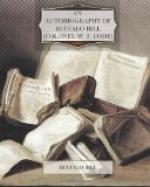“If Elijah Cody is your uncle, I am too,” said my father. “You must be the long-lost Horace Billings.”
Father had guessed right. Horace had wandered long ago from the Ohio home and none of his family knew of his whereabouts. He had been to South America and to California, joining a band of trappers on the Columbia River and coming with them back across the Plains.
When I showed him my pony he offered to help break him for me. With very little trouble he rode the peppery little creature this way and that, and at last when he circled back to camp I found the animal had been mastered.
In the days that followed Horace gave me many useful lessons as a horseman. He was the prettiest rider I had ever seen. There had been a stampede of horses from the Fort, and a reward of ten dollars a head had been offered for all animals brought in. That was easy money for Horace. I would gallop along at his side as he chased the fugitive horses. He had a long, plaited lariat which settled surely over the neck of the brute he was after. Then, putting a “della walt” on the pommel of his saddle, he would check his own mount and bring his captive to a sudden standstill. He caught and brought in five horses the first day, and must have captured twenty-five within the next few days, earning a sum of money which was almost a small fortune in that time.
Meanwhile the Territory had been opened for settlement. Our claim, over which the Great Salt Lake trail for California passed, had been taken up, and as soon as father and I, assisted by men he hired, could get our log cabin up, the family came on from Weston. The cabin was a primitive affair. There was no floor at first. But gradually we built a floor and partitions, and made it habitable. I spent all my spare time picking up the Kickapoo tongue from the Indian children in the neighborhood, and listening with both ears to the tales of the wide plains beyond.
The great freighting firm of Russell, Majors & Waddell was then sending its twenty-five wagon trains out from the Plains to carry supplies to the soldiers at the frontier forts. Leavenworth was the firm’s headquarters. Russell stayed on the books, and Majors was the operating man on the Plains. The trains were wonderful to me, each wagon with its six yoke of oxen, wagon-masters, extra hands, assistants, bull-whackers and cavayard driver following with herds of extra oxen. I began at once making the acquaintance of the men, and by the end of 1854 I knew them all.
Up to this time, while bad blood existed between the Free-soilers and the pro-slavery men, it had not become a killing game. The pro-slavery Missourians were in the great majority. They harassed the Free-soilers considerably and committed many petty persecutions, but no blood was shed. Father’s brother, Elijah, who kept the store at Weston, was known to be a pro-slavery man, and for a time it was taken for granted that father held the same views. But




